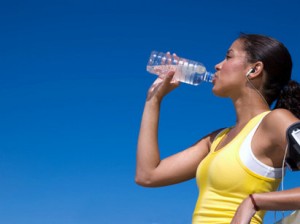Nutrition can be complicated, when trying to figure out where to start. Not many individuals want to know the scientific details behind why certain nutrients do what they do. However, we are all interested in trying to find some basic nutrition guidelines to help us get the most from our diet and fitness programs. Here are a few helpful tips to guide you through your day.
 On a consistent basis, exercise requires that you maintain a good supply of high-quality energy to your working muscles. Any nutritional professional (and most likely your mother) will tell you that breakfast is the most important meal of the day. Your body has been fasting overnight, and the first thing in the morning you need to do is fuel up for the day. Make sure to eat a balanced breakfast and continue to refuel with a variety of high-quality foods throughout the day.
On a consistent basis, exercise requires that you maintain a good supply of high-quality energy to your working muscles. Any nutritional professional (and most likely your mother) will tell you that breakfast is the most important meal of the day. Your body has been fasting overnight, and the first thing in the morning you need to do is fuel up for the day. Make sure to eat a balanced breakfast and continue to refuel with a variety of high-quality foods throughout the day.
Glycogen is the fuel that makes exercise possible. We get glycogen from carbohydrate. Carbohydrates must be eaten each day to be consistent, especially when you are training or in some type of fitness regimen. Protein and fat must also be consumed on a daily basis. The combination of all three should be a variety throughout the day. Most people consume their fair share of fat among the foods he/she eats every day already. When looking at sources of protein, try to aim towards leaner meats (chicken/fish) or legumes. When consuming carbohydrates, select items that are going to contain whole grains or are high in complex carbs such as fruit and vegetables.
 If you exercise in the evening, manage your lunch with easily digestible foods that are high in complex carbohydrates such as whole grain pastas and breads, and fruits and vegetables. Make sure to add your lean proteins as well. When exercising in the morning, a light breakfast may be in order. Again, make sure you are having a variety such as a whole grain bagel or toast, fruit, and peanut butter or egg for protein. You can experiment with all kinds of combinations. About 30 minutes before working out, make sure to provide the body with a small snack and plenty of water.
If you exercise in the evening, manage your lunch with easily digestible foods that are high in complex carbohydrates such as whole grain pastas and breads, and fruits and vegetables. Make sure to add your lean proteins as well. When exercising in the morning, a light breakfast may be in order. Again, make sure you are having a variety such as a whole grain bagel or toast, fruit, and peanut butter or egg for protein. You can experiment with all kinds of combinations. About 30 minutes before working out, make sure to provide the body with a small snack and plenty of water.
I will constantly promote hydration and keeping the body hydrated to avoid any setbacks or complications. 6-8 ounces of water should be consumed in the hour before workout, and continual water should be added throughout and after a workout. If your activity carries on for more than 90 minutes, start drinking a sports drink as well to replenish electrolytes. An easy trick to establish how much water should be consumed from exercise is to weigh yourself before and after exercise. Every pound lost during exercise equals about 700ml/20-24oz (3 cups) of water that should be consumed.
Also, if participating in endurance exercise, studies have shown that it is best to replenish adequate glycogen stores by consuming 100-200 grams of carbohydrate within 2 hours following exercise. Protein is also recommended in small dosage to help repair any damage among muscle cells and the rebuilding of those same cells.
Good luck out there!
~Jules




